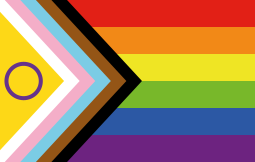Starting this month you can throw bricks at chuds
The rainbow flag or pride flag is a symbol of LGBT pride and LGBT social movements. The colors reflect the diversity of the LGBT community and the spectrum of human sexuality and gender. Using a rainbow flag as a symbol of LGBT pride began in San Francisco, California, but eventually became common at LGBT rights events worldwide.
Originally devised by the artists Gilbert Baker, Lynn Segerblom, James McNamara and other activists, the design underwent several revisions after its debut in 1978, and continues to inspire variations. Although Baker's original rainbow flag had eight colors, from 1979 to the present day the most common variant consists of six stripes: red, orange, yellow, green, blue, and violet. The flag is typically displayed horizontally, with the red stripe on top, as it would be in a natural rainbow.
LGBT people and allies currently use rainbow flags and many rainbow-themed items and color schemes as an outward symbol of their identity or support. There are derivations of the rainbow flag that are used to focus attention on specific causes or groups within the community (e.g. transgender people, fighting the AIDS epidemic, inclusion of LGBT people of color). In addition to the rainbow, many other flags and symbols are used to communicate specific identities within the LGBT community.

- 🐻Link to all Hexbear comms https://hexbear.net/post/1403966
- 📀 Come listen to music and Watch movies with your fellow Hexbears nerd, in Cy.tube](https://live.hexbear.net/c/movies
- 🔥 Read and talk about a current topics in the News Megathread https://hexbear.net/post/5042186
- ⚔ Come talk in the New Weekly PoC thread https://hexbear.net/post/4738774
- ✨ Talk with fellow Trans comrades in the New Weekly Trans thread https://hexbear.net/post/5039365
- 👊 New Weekly Improvement thread https://hexbear.net/post/5031369
- 🧡 Disabled comm megathread https://hexbear.net/post/4891939
- Parenting Chat https://hexbear.net/post/5020579
reminders:
- 💚 You nerds can join specific comms to see posts about all sorts of topics
- 💙 Hexbear’s algorithm prioritizes comments over upbears
- 💜 Sorting by new you nerd
- 🌈 If you ever want to make your own megathread, you can reserve a spot here nerd
- 🐶 Join the unofficial Hexbear-adjacent Mastodon instance toots.matapacos.dog
Links To Resources (Aid and Theory):
Aid:
Theory:
Having lived my entire life far from anything anyone could call "gang activity", is there a good resource anyone knows of for learning about how gangs work that isn't phrenology or copaganda? I think the conditions that they emerge from are pretty obvious to point out, but how I'm made to understand how they actually work doesn't seem to fit. Why do gangs seem to always punch down and lack revolutionary potential, or even basic community building? Is my framing completely wrong from the jump?
What happens that separates, say, Crips from Black Panthers?
I wish I had any. Unfortunately the waters have been muddied by fields like criminology, which are basically limited to a liberal analysis of the all-to-abstract individual, psychology, etc. Like of course things like crime, and justice are a reflection of class-struggle--so in analyzing things like gangs, especially in the period of history you referrence, this generally becomes subsumed into broader theoretical concerns.
To (try and) answer your questions what separates the BPP from something like the crips is, first of all, ideology (see Revolutionary Action Movement), which, through the struggle of some dedicated revolutionaries, precipitated into a line, and program, which responded to the conditions of its time.
What confounds us is how can something like the Crips--which as far as I know was started because some guy got mad at being beat up at the gym...--come to dominate a whole era after the demise of the BPP?
At this point I can only speculate: yes, from the broadest view point the gangs that came to define the 70s--90s were a counter-offensive against the Black nationalism of the 60s, and insofar as the Black national question is a (big) component of the proletarian class struggle in this country we could call it a counter-offensive of the ruling class. BUT, the question remains, was it a conscious effort by the state, or a secondary effect of the decline of the World Proletarian Revolution that was happening at the same time? Was it a strategy, or simply a tactic to nurture these violent, petty conflicts against these revolutionary organizations. Etc. the connection is there, but remains to be fully fleshed out.
Also I wrote this on my phone so typos galore!
do you define gang as "a group of black people"? that's the only way the black panthers could be considered a gang
some of the major gangs formed out of the vacuum created by the destruction of the BPP so that question isn't totally naked clownery and i don't think he's implying the BPP was a gang by asking.
I worded that badly sorry, my break was ending and I didn't have time to read it over carefully. I meant to say "What happens that results in a gang vs a non-gang group like the black panthers."
Both are organizations of the lumpenproletariat, and I do not believe he meant to call the Panthers a gang, but to ask why specifically do gangs lack revolutionary potential.